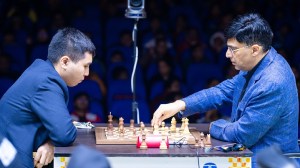Pope Paul confounds soothsayers
Pope John Paul II marked the 26th anniversary of his pontificate on Saturday, defying medical odds and confounding predictions about any suc...

Pope John Paul II marked the 26th anniversary of his pontificate on Saturday, defying medical odds and confounding predictions about any successor. Debilitated by Parkinson8217;s, unable to walk, sometimes unable to speak clearly, the 84-year-old pontiff has defied premature predictions of his imminent demise for at least 10 years.
He is already the third-longest serving pontiff in history. Only St. Peter and Pius IX served longer, both reigning for more than 30 years in the 1st and 19th centuries, respectively.
A close aide of the Polish Pope said recently, that a number of journalists and critics who wrongly predicted his death over the past decade 8216;8216;are already in heaven8217;8217;.
But while some of his critics may already be in paradise, is the Pope himself running the shop back here on earth?
Aides say yes. Critics say no.
8216;8216;He is still in charge, signing off on documents and the naming of Bishops,8217;8217; said an aide asked not to be identified.
On Friday, the Pope received three Bishops, one Cardinal, a group of pilgrims and was attending an anniversary concert in his honour by the choir and band of Russia8217;s Red Army.
Critics say he is not in charge, or at least, not as much as he should be.
8216;8216;The Church is going through what can be called a case of the blues, the blues of the end of a reign, which seems to be never-ending, marked by the Pope8217;s enormous physical frailty,8217;8217; wrote the French Left-wing Catholic weekly Temoignage Chretien.
In his new book, The Pontiff in Winter British writer John Cornwell says the Pope is often distant in private meetings and suggests that the Vatican is being run by Papal aides.
8216;8216;For six years or so, gradually and without public awareness, John Paul had been leaving more and more of the running of the Church to others,8217;8217; Cornwell writes.
But what Cornwell calls the Pope8217;s 8216;8216;dogged hold on power8217;8217; for his refusal to step down, is held up as heroic Christian witness by his supporters. John Paul has left a conservative stamp on his Church of a billion souls, naming nearly all of the Cardinals who will choose his successor in a secret conclave after his death. But front-runners in the succession list appear and fade like the morning fog over St Peter8217;s Square in winter.
In 1994, the magazine of a leading US newspaper ran a cover story on his decline and named six possible successors.
Only two are still in the running. The others have either died, resigned or turned 808212;the cut-off age after which, a cardinal cannot enter a conclave.
One who had faded from pundits8217; list, but has now resurfaced, is 71-year-old Nigerian Cardinal Francis Arinze, who would become the first African Pope in some 1,500 years.
Arinze has worked in the Vatican for 20 years, many of them as the Pope8217;s pointman for relations with Islam.
Since September 11, 2001 and the war in Iraq, a key requisite in the Papal job profile is the ability to reach out to the Muslim world.
Other candidates mentioned recently include Claudio Hummes of Brazil, Dionigi Tettamanzi of Italy, Oscar Andres Rodriguez Maradiaga of Honduras and Christoph Schoenborn of Austria.
But an old Roman adage warns of trying to predict the outcome of the conclave. It says: 8216;8216;He who enters a conclave as a Pope, leaves it as a Cardinal.8217;8217; 8212;Reuters
- 01
- 02
- 03
- 04
- 05































